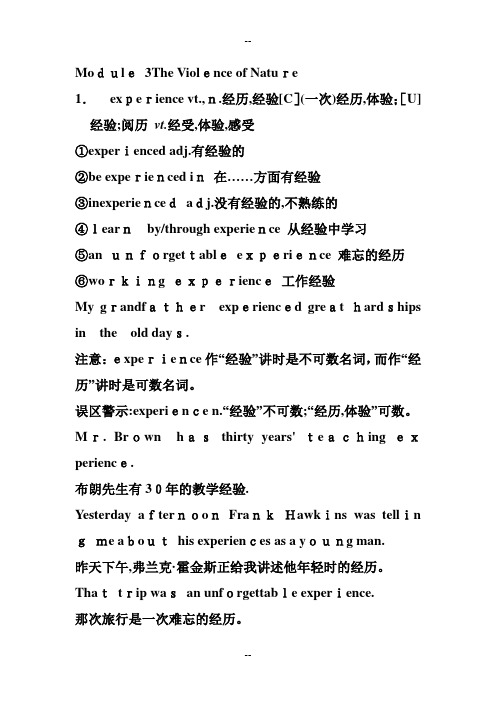外研版高中英语必修3 Module 3《The Violence of Nature》(SectionⅢ)课件
- 格式:ppt
- 大小:1.24 MB
- 文档页数:57

Book 3 Module 3 The Violence of NaturePeriod 1 Key words【课前预习】1.主题语境:本模块为“人与自然”主题下对“自然灾害与防范的探讨”。
文章介绍了龙卷风、飓风、地震等几种自然灾害,并描绘了人们在自然灾害中的经历和感受。
2.表达性技能:学会写一篇关于自然灾害的报道。
3.课时任务:通过阅读课文,了解龙卷风、飓风等自然灾害以及与飓风有关的奇怪事件,体会人们在经历自然灾害之后的感受,了解自然灾害的危害,提高自我保护和珍爱生命的意识。
【知识清单】一、[原文再现] Do you know anyone who has experienced one of the events? 你知道有谁经历过这些事件中的一件吗?experience vt. 经历;体验n. [C]经历;体验[U]经验常用搭配:experienced adj.有经验的;经验丰富的be experienced in在……方面有经验from / by experience 凭经验;从经验中full of experience 经验丰富have experience in在……方面有经验get / gain experience 获得经验1.What I saw was completely unlike anything I had experienced in the past.我所看到的完全不同于我过去所经历的。
2.She wants to know why her grandfather never spoke about his experiences in World War II.她想知道为什么祖父从不谈起他自己在第二次世界大战时的经历。
3.In the early days, she moved jobs to get experiences. 起初她通过换工作来获得经验。
4.I have experience in checking information from printed sources and from interview.我有从印刷资料及采访中校验信息的经验。



Module3The Violence of Nature1.experience vt.,n.经历,经验[C](一次)经历,体验;[U]经验;阅历vt.经受,体验,感受①experienced adj.有经验的②be experienced in在……方面有经验③inexperiencedadj.没有经验的,不熟练的④learnby/through experience 从经验中学习⑤an unforgettableexperience 难忘的经历⑥working experience工作经验My grandfather experienced great hardships in the old days.注意:experience作“经验”讲时是不可数名词,而作“经历”讲时是可数名词。
误区警示:experience n.“经验”不可数;“经历,体验”可数。
Mr. Brown hasthirty years' teaching experience.布朗先生有30年的教学经验.Yesterday afternoonFrankHawkins was tellin gme abouthis experiences as a young man.昨天下午,弗兰克·霍金斯正给我讲述他年轻时的经历。
Thattrip wasan unforgettable experience.那次旅行是一次难忘的经历。
Ilearned more from experiencethan fromreading books.我从实践中学到的比从书本上学到的更多。
朗文在线:①Thejob requires no secretarialexperience.这个职位无需秘书工作的经验。
②In my experience, thesethings neverlast very long.从我的经验来看,这些事情从未长久过。

Module 3The Violence of NaturePeriod 2Reading and vocabulary整体设计教学内容分析作为本模块的主课文,这三篇文章应该作为精读课来处理。
这节课应该以训练学生的阅读理解能力为主。
教师应该给学生提供一些阅读方法的指导来帮助学生提高略读(skimming)和查读(scanning)的能力。
学生应该在快速略读(skimming)后把握每篇课文的主旨大意,在查读(scanning)后获取关于每篇课文的一些具体信息。
读后活动的设计应该集中在考查学生对每个自然灾害及其带来的危害与损失的理解和表述上。
在这节课,学完课文之后,学生应该能够学会给某一自然灾害下定义,并学会用自己的话描述每个自然灾害。
此外,学生应该熟练掌握与运用本课课文中出现的描述自然灾害的动词和动词短语。
三维目标设计Knowledge and skills1.To help the students learn the following words and expressions.(The context should be emphasised.)Words:current,latitude,furniture,bury,feather,fur,occur,tropical,equator,rotating,violent,wave,strike,cemetery,coffinExpressions:pick up,take off,on average,end up2.To help the students revise the following words and expressions in this period:Words:flow,death,injury,affectExpressions:more than,put down3.To help the students master ways of describing disasters using words and expressions they've learnt.Process and methods1.To encourage the students to take an active part in the learning activities by giving them clear instructions on what to do while reading a new passage.In addition,correct possible mistakes they might make in a proper way by making necessary changes while repeating their sentences.2.To encourage the students to cooperate with the others by working in pairs and in groups of four.3.To make sure that the students pay attention to important points by asking them to repeat some of the statements made by both the teachers and other students.Emotional,attitude and value1.To let the students have confidence in learning English and express themselves freely.2.To help the students to appreciate the advantage of cooperative learning.教学重点1.To help the students to learn how to read a passage in a proper way and improve their ability of skimming and scanning.2.To help the students to master the verbs and verb phrases to describe a disaster.3.To help the students learn to organize their own sentences to describe disasters.教学难点1.To help the students to learn to organize their own sentences to describe disasters.2.To carry out accurate evaluation while dealing with the students' sentences they make to express their ideas in class.教学过程Pre-reading 【5 min.】1.Ask the students to read about the Gulf Stream and learn about the meaning of it.2.Warm up:Ask the students to take a look at the two photos on page 23 and try to describe the first impression of each disaster.Call back some answers from the class.While-reading 【20 min.】1.SkimmingAsk the students to read through the three passages fast and silently,and pay attention to thefirst sentence of each passage.Give them suggestions that they should focus on the general idea and not on the detailed meaning.Check the main idea of each passage with the whole class.2.Scanning1.Get the students to read the third passage again and retell the story according to the following key words and time clue.born→lived→moved→By the late 1890s→In 1899→In 1900→destroyed→ended up in→wa s found2.DiscussionGet the students to work in groups of four and discuss the following two questions according to the instructions.Instructions :From this class ,we have learnt the bad results of the natural disasters ,including the tornado and the hurricane.We have felt the violence of nature.Everybody wants a better place to live.But we can't tell nature to do what we want it to.In fact ,one of the causes of the natural disasters is the problem of global warming.Please have a group discussion and try to discuss the following questions.1)What's your idea about the problems that nature brings to us.________________________________________________________________________2)Faced with so many problems ,what can we do?________________________________________________________________________Language study 【8 min.】1.Punctuate the following paragraph and translate it ,paying attention to the underlined words or phrases.tornadoes can pick_up cars trains and even houses and put them down in the next street or even in the next town they can_take the fur off the back of a cat and the feathers off_a chicken they can destroy houses but leave the furniture inside exactly where it was2.Read the following sentences and write down the meaning of pick up in each sentence.1)Tornados can pick up cars ,trains and even houses.______2)The boy picked up the hat for the old man.______3)He picked up French while he stayed in Paris.______4)Can you do me a favor to pick up my daughter from school ?______5)He picked up some used stamps.______3.Read the following sentences and tell the common use of the underlined words.1)The worst hurricane disaster of all time occurred_on the 8th September 1900 in Galveston ,Texas.2)Winds of 200 kilometres per hour and five-metre high waves hit the city.3)By the late 1890s,he had moved to Galveston,where he died in 1899,a year before the hurricane struck.4.Translate the sentence using the three words occur,hit and strike.2008年5月12日,汶川发生了可怕的大地震。

Module3 The Violence of Nature一、教材分析1. 话题:本阅读课是围绕整个单元的中心话题“The Violence of Nature”而展开的。
2. 内容:本文描述了龙卷风和飓风这两大自然灾害爆发的时间、地点、情形、经过、最后的结果、造成的危害、人员财产损失的情况。
最后以Charles Coghlan 的经历讲述了一个与飓风有关的离奇故事。
3. 目标:①扫清课文中出现的生词障碍;②理解课文内容,理清篇章的组织脉络;③引导学生学会根据主题理解文章细节的能力和根据关键词复述课文的能力。
二、教学实践1.教学步骤step 1. Warming up1)以introduction 部分的图片入手,引出本课关于自然灾害的词汇,然后用brainstorm的形式让学生快速想出相关词汇。
2) Discussion: Have you ever experienced such an event or read a news story about one of the events? Can you describe it? 让全班学生两人一组互相讲述自己的经历,有利于激发学生说的兴趣,在学生的相互交流中培养起发现问题和解决问题的能力,然后让个别学生起来展示,培养学生的自信心和表达能力,同时也自然过渡到了本节主题。
Step 2. Reading1)Skimming 快速阅读全文,理清大意;2)Scanning ①细读文章,回答part2 的问题。
提问学生展示答案,针对有问题的答案让学生讨论后再做纠正,培养其自主解决问题的能力。
②然后再从definition,speed,phenomena and worst event 几个方面比较tornado and hurricane的不同之处,旨在培养学生理解细节和提取信息的能力。
3)Exercise 进一步加强学生对文章的理解。
Step 3. Post-readingRetell the passage.组织学生重述课文内容来加强学生对全文的理解,同时也锻炼了学生的口语能力。